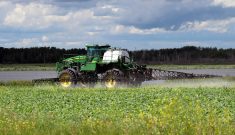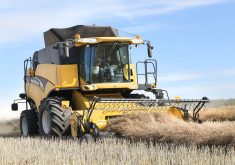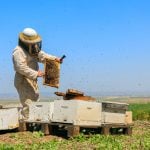China hits Canadian canola with anti-dumping probe
China started an anti-dumping investigation into canola imports from Canada after Ottawa moved to impose tariffs on Chinese electric vehicles.
Canada followed the lead of the United States and European Union by announcing a 100 per cent tariff on imports of Chinese electric vehicles and a 25 per cent tariff on imported steel and aluminium from China.
Read Also

Saskatchewan agriculture sector receives federal funding
PrairiesCan funding will assist in the continued growth of Saskatchewan’s ag research and manufacturing sectors.
Other stories in the Canola Yearbook 2024:
- A new era for crop genetics
- Shrinking production estimate supports canola bids
- Canola goals must be reassessed to match market reality
- Canola growing season in review
- Canola remains a Prairie economic powerhouse
- Bill C-234 ping pongs between Senate and House
- Verticillium, blackleg and gophers
- Sustainability incentive for canola growers
- What made canola so strong?
- Science news briefs
- Tiny allies may help withstand drought
- Canola and climate change in Western Canada
- Production news briefs
- The future of gene editing in canola
- Canola views – photo essay
“China strongly deplores and firmly opposes the discriminatory unilateral restrictive measures taken by Canada against its imports from China despite the opposition and dissuasion of many parties,” a commerce ministry spokesperson said in a statement.
The ministry said China will also initiate an anti-dumping investigation into some Canadian chemical products.
More than half of canola exported by Canada makes its way to China, the world’s biggest oilseed importer.
Canola growers want support in trade dispute
Grain growers should be treated the same as dairy, egg and poultry farmers when it comes to trade upheaval, says a farm group.
That was one of the main messages in a letter the Wheat Growers Association recently sent to Mary Ng, federal minister of export promotion, international trade and economic development.
“Over the past few years, the Government of Canada has seen fit to offset the impact of trade agreements on the supply-managed sectors,” stated the letter dated Sept. 4.
“We ask that the same consideration be extended to export dependent farmers when our products are targeted with retaliatory measures.”
In 2023, the federal government announced it will dole out more than $4.8 billion to dairy farmers, poultry and egg producers and processors of supply-managed commodities to compensate them for lost market share resulting from three major trade agreements.
Canola-wheat yield difference widens this year
The yield gap between spring wheat and canola is substantial this fall in western Manitoba.

In some instances, the gap is 30 bushels per acre.
The Manitoba Agriculture crop report for Oct. 2 says the average spring wheat yield in the northwest region of the province is 65 to 70 bu. per acre.
Meanwhile, canola yields are lower than previous years.
“Average yields so far have been approximately 30 to 40 bu. per acre,” says the crop report.
Jocelyn Velestuk, SaskWheat vice-chair, also saw a yield gap on her farm in eastern Saskatchewan near Broadview — maybe not 25 to 30 bu. but a significant difference between spring wheat and canola.
“Yes, the same thing happened out in Saskatchewan,” she said.
“Last year it (the yield gap) was much closer and we had less moisture. You’re scratching your head. What happened?”
Yield estimates from Alberta are showing a 15 bu. difference between spring wheat and canola.
U.S. ag secretary rejects biofuel restrictions
Canada’s canola sector has a powerful ally in the feedstock fight that has broken out in the U.S. biofuel industry.
Forty-one members of the U.S. House of Representatives recently sent a letter to the Treasury Department urging that the final guidance for the Section 45Z Clean Fuel Production Tax Credit restrict eligibility to renewable fuels made from domestically sourced feedstocks.
“If drafted and implemented per congressional intent, 45Z will support American energy independence by incentivizing production of biofuels made with domestically produced feedstocks,” stated the letter.
Similar letters have been submitted by a group of 16 U.S. senators and a collection of farm organizations.
The National Oilseed Processors Association (NOPA) noted in a recent news release that the United States imported 7.9 billion pounds of used cooking oil (UCO) and tallow between Jan. 1, 2023, and June 30, 2024. That is the equivalent to the soybean oil crushed from more than 650 million bushels of soybeans.
Canola crush productivity doubles in 20 years
When compared to other parts of Canada’s food industry, oilseed crushing is a superstar.
From 2003-23, the productivity growth in grain and oilseed milling was 107.4 per cent.
In comparison, productivity growth in Canada’s dairy processing industry during the same period was only six per cent.
Those figures come from a Farm Credit Canada report on food manufacturing in Canada, released in late August.
The report focuses on productivity, which tracks “how well we turn inputs into outputs,” FCC says.
“The most common measure is labour productivity, which measures gross domestic product per hour of work…. Improving productivity can help stabilize the food supply and prices, strengthen businesses and make Canada more competitive in the global market.”
MRL pacts can help avoid trade spats
Canadian farmers avoided what could have been a nasty trade dispute with Mexico earlier this year, when that country was planning to ban use of glyphosate on April 1.
Its decision could have prohibited any glyphosate residue in oats, canola and other crops that Mexico imports from Canada.
Days before April 1, Mexico’s government delayed the ban because there isn’t a suitable replacement for the herbicide.
That avoided a trade battle between Canada, the U.S. and Mexico over the safety of glyphosate — for now.
The close call illustrates the value of maximum residue limits for pesticides and why countries need to co-operate on MRLs.
If nations can’t agree on safe levels of pesticides in grain, fruits and vegetables, agricultural trade becomes more complex.
California shocks canola sector
Canada’s canola processors have been blindsided by proposed amendments to California’s Low Carbon Fuel Standard.

“We’re surprised and disappointed with what they’re proposing,” said Chris Vervaet, executive director of the Canadian Oilseed Processors Association.
The California Air Resource Board (CARB) published its proposed amendments Aug. 12.
They include a 20 per cent cap on the amount of biomass-based diesel (biodiesel and renewable diesel) that can be made from soybean and canola oil.
“It’s very concerning, especially because there is room for growth in the California market,” said Vervaet.
“If you put caps in place on feedstocks like soybean and canola oil, that really limits those opportunities.”















